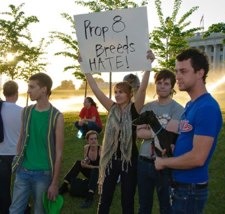
Lamentably dry in its execution despite an almost nonstop flow of tears, 8 moves between its line-by-line, week-by-week takedown of the LDS's involvement in the vote on Proposition 8 and the story of a California gay couple who married in the summer of 2008. Footage of their (teary) union -- a bust of Harvey Milk presiding in the background of a San Francisco courthouse -- is followed by an intriguing but numbingly presented exposé of the pilot PR campaign the LDS waged in Hawaii in the 1990s; their success in stopping gay marriage there led them to try it again in California. Both halves of the newly married couple were raised Mormon (as was Cowan and narrator and Milk writer Dustin Lance Black), and one is the fifth-generation descendant of a prominent Utah Mormon who was driven from the country for his polygamist practices. Is there any difference between the struggles of these two men, their insistence on the right to an "alternative marriage"? The juxtaposition is made to a somewhat quizzical end: By even casually aligning their plights, the more powerful angle on polygamy -- that of exposing the Church's hypocrisy -- is weakened. It is also a typical example of the film's tendency to sail past its own provocative or cross-purposed suggestions, carried by the wave of emotion it relies on for effect.
8 is most coherent as a chilling confirmation of both the mind-warping power of an institution like the Mormon Church and the extent to which politics is, above all, a marketing game. The LDS, having deduced how easy it is to juke the system -- by hiring signature-collecting companies, drafting door-to-door volunteers, and creating slick, doublespeak campaign ads -- blanketed California, where less than 2 percent of the population is Mormon, with anti-gay marriage propaganda. They raised a huge sum of money ("Obama money," as one reporter notes) by strong-arming their congregants with encoded threats of God's wrath. It's saddening and infuriating to learn of a middle-class couple with four children donating $50,000 to such a cause; it's terrifying to hear the cold, impassive voice of the father of a gay son whose faith-based torment led him to commit suicide: "We don't have any position but what the Church's position is."
There is a long digression into the scourge of gay suicides within the Mormon Church, and an exploration of the horrendous, torturous "therapy" inflicted on homosexuals who sought counsel from their church or school. More directly to the point is the film's exposure of the legal ramifications of the Church -- which enjoys tax-exempt status -- running a political campaign. And although passing reference is made to the Mormons buddying up with the Catholics and finding other false fronts for their cause, the film hinges on the presumption that enough money can buy you anything, even a vote for religious bigotry.
But it was the Californians -- not the Mormons or their Utah constituents -- who voted in Prop 8, notably 70 percent of the state's black voters; what were they thinking? Although there is plenty of illuminating and indicting information about the run-up to the vote, you won't find the answer to that question here.